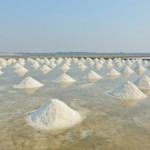The American Medical Association newsletter for March 22, 2013, focused on our excess salt (sodium chloride) intake threatening the health of both adults and kids in this country. Two major studies were discussed.
The ABC Medical Unit blog on the subject had the title "1 in 10 U.S. deaths blamed on salt." The research came from a Harvard epidemiologist, Dr. Dariush Mozaffarian who links excess dietary sodium worldwide to almost 2.3 million deaths yearly (2010 data). The same researcher had a project looking at the impact of added-sugar beverages; now he concludes that excess sodium was a worse culprit.
The question has always been whether reducing dietary sodium intake, widely acknowledged to reduce blood pressure, can also positively impact the occurrence of cardiovascular disease. One classic article, published in the British Medical Journal in 2008, originally studied ~3,000 adults with prehypertension (i.e., blood pressures that aren't over the 140/90 limit, but are trending that way; Mayo Clinic staffers uses 120-139 over 80 to 89 to define the entity). The group, age 30 to 54, were enrolled for one to four years in randomized lifestyle intervention trials, called TOHP (trials of hypertension prevention). The long-term effects on the TOHP participants (over 10 to 15 years) showed cardiovascular disease events (heart attacks or strokes) were less frequent (25-30%) in the group originally assigned to a lowered salt intake diet.
Many of us eat (or in my case used to eat) a diet higher in sodium than is currently recommended. I cut way down on salt nearly thirty years ago when my blood pressure crept up, eating out less often, not purchasing packaged foods unless their labels revealed relatively less salt, cooking with half to a third of the salt a recipe suggested and not adding salt at the table. There is evidence that our preference for eating salty foods can "reset" in about three months on a reduced salt diet and I would certainly concur with this; salty foods just taste bad if I try them now.
Dr. Mozaffarian's data, recently presented at an American Heart Association (AHA) meeting in New Orleans, was a compilation of 247 surveys on sodium intake and 107 clinical trials. The latter set examined both salt's effect on blood pressure and the logical, though unproven corollary that lowering BP can have a positive effect on the development of cardiovascular disease (CVD).
The results strongly support the evidence that high-salt packaged and processed foods contribute to our epidemic of CVD. Dr. Mozaffarian was quoted as saying bread and cheese are the top two sources of sodium in the U.S. diet.
Another of the researchers involved in the study was quoted as saying, "This study is the first time information about sodium intake by country, age and gender is available. We hope our findings will influence national governments to develop public health interventions to lower sodium."
That would be wonderful, but in the meantime, it's up to us (and I'll say this over and over) to read labels for sodium content.
As usual the Salt Institute tried to minimize the research's impact on the average American, saying it hadn't yet been published in a peer-reviewed journal and was misleading. Of course they make their living selling and promoting salt, so I take their comment with a grain of...pepper.
A second study, presented at the same AHA conclave, said that 75% of people around the world consume much more than the recommended amount of salt. Figures from 2010 said the worldwide average was close to 4,000 milligrams per day as opposed to the World health Organizations suggested 2,000 mg and the AHA's newer 1,500 mg figure.
The clues to having less salt in your diet: start with reading labels (we've done this for years, deliberately picking, for example, lower-salt versions of spaghetti sauce and cheeses. Obviously, as I've written before, avoiding pre-packaged meals in favor of fresh vegetables and fruits is another salt-avoidance technique. Re-training your palate, as noted above, may be easier than you think.
Another study, headed by Joyce Maalouf, a fellow at the CDC's National Center for Disease Control and Prevention, was featured online by Science Daily on March 21, 2013. This one looked at pre-packaged foods for young children in the United States. Over 1,100 products sold in our grocery stores and designed for the baby and toddler market were evaluated. A cutoff level of 210 mg of sodium per serving was established and toddler meals, on average, exceeded that level 75 percent of the time, some by a factor of three (630 mg of sodium per serving).
Let's look at the logic. If it only takes three months to educate an adult's sense of what's enough salt in a meal, then it seems to me we're training our toddlers to prefer high-salt food items when they are too young by far to be doing their own shopping.
The take for us as parents and grandparents is to read labels, not only on foods that we may choose for ourselves and the adult members of our families, but also (and especially) for our youngsters.
Maalouf's data, highlighted in a CNN article online mostly looked at pre-packed meals that are typically heated in a microwave. She noted that the USDA recommended total intake levels for toddler sodium consumption were 1,000 to 1,500 mg per day.
My experience with kids at the that age is like hers (while much more limited); they are "walking appetites" and in some households are allowed to eat six to eight snacks a day. That can add up to an enormous amount of salt and form dangerous eating habits that last a lifetime.
Again the basic lesson is the same: read labels and vote with your choices of lower-sodium foods. If enough of us quit purchasing high-salt items, they will eventually go off the market.
And ignore the voices of those whose basic interest isn't your health or that of your children, but rather their own profit margin.



